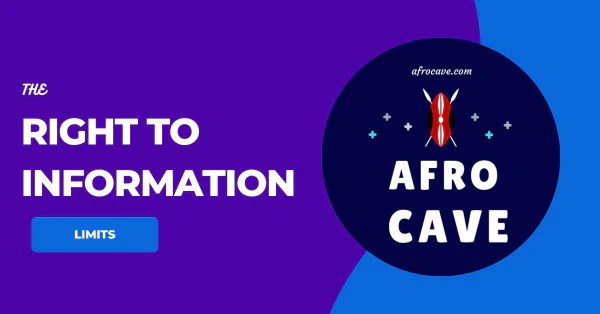Limitation of the Right of Access to Information in Kenya
- Author Gĩthĩnji
- Updated on:

In Kenya, the Access to Information Act specifies the limitations on the right to information. According to Article 24 of the Constitution, which provides grounds for limiting certain rights and fundamental freedoms, the Act restricts access to certain information in Kenya.
Article 35 of Kenya’s Constitution guarantees the right to information. Every citizen has the right to access information the State holds and information another person holds necessary to exercise or protect any right or fundamental freedom.
Every person has the right to have false or misleading information about them corrected or removed. The State shall publish and make public any information affecting the nation.
Limits of the right of access to information in Kenya
Section 6 of the Access to Information Act contains the provisions on the limitation of the right of access to information in Kenya.
Article 24 of the Constitution states that the right to information under Article 35 of the Constitution shall be limited to information whose disclosure is likely to–
- undermine the national security of Kenya;
- impede the due process of law;
- endanger the safety, health or life of any person;
- involve an unwarranted invasion of the privacy of someone other than the applicant or the person on whose behalf an application was made with proper authority;
- significantly jeopardize the commercial interests, including intellectual property rights, of the entity or third party from which the information was obtained;
- cause significant harm to the government’s ability to manage Kenya’s economy;
- significantly impair a public or private entity’s ability to give adequate and prudent consideration to a matter with no final decision yet and which is still under active consideration;
- damage a public entity’s position in any actual or contemplated legal proceedings; or
- infringe professional confidentiality as recognized in law or by the rules of a registered association of a profession.
The sections above shall not apply in limitation of the right of access to information if a request for information relates to the results of any product or environmental testing, and the information concerned reveals serious public safety or environmental risk–
- involve the unwarranted invasion of the privacy of an individual, other than the applicant or the person on whose behalf an application has, with proper authority, been made;
- substantially prejudice the commercial interests, including intellectual property rights, of that entity or third party from whom information was obtained;
Information relating to national security includes–
- military strategy, covert operations, doctrine, capability, capacity or deployment;
- foreign government information with implications on national security;
- intelligence activities, sources, capabilities, methods or cryptology;
- foreign relations;
- scientific, technology or economic matters relating to national security;
- vulnerabilities or capabilities of systems, installations, infrastructures, projects, plans or protection services relating to national security;
- information obtained or prepared by any government institution that is an investigative body in the course of lawful investigations relating to the detection, prevention or * suppression of crime, enforcement of any law and activities suspected of constituting threats to national security;
- information shared between the national and county governments deemed detrimental to the conduct of business at both levels of government;
- cabinet deliberations and records;
- information that shall be provided to a State organ, independent office or a constitutional commission when conducting investigations, examinations, audits or reviews in the performance of its functions;
- information that the Kenya Defence Forces Act refers to as classified information; and
- any other information whose unauthorized disclosure would prejudice national security.
A public entity or private body may be required to disclose information where the public interest in disclosure outweighs the harm to protected interests as a Court shall determine.
When considering the public interest, the constitutional principles governing the need to the following shall receive special consideration–
- promote accountability of public entities to the public;
- ensure that the use of public monies is subject to proper scrutiny;
- promote informed debate on issues of public interest;
- keep the public adequately informed about the existence of any danger to public health or safety or the environment; and
- ascertain that any statutory authority with regulatory obligations is doing its duties properly.
A public entity is not obliged to supply information to a requester if that information is reasonably accessible by other means.
Unless the public entity or private body proves otherwise, information is presumed not to be exempt if the entity or body has held it for more than thirty years.
For more information about the limitation of the right of access to information in Kenya, see the Access to Information Act.


